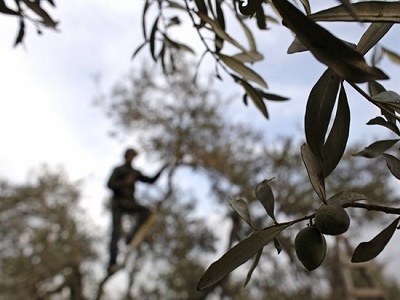
By Mahmoud Zidan
While driving the other Friday, I couldn’t help but notice the hustle and bustle of olive pickers: the combined joys of their gathering together, eating out under an olive tree, chitchatting, joking, and occasional singing; all of which are interspersed with shouts of children playing around and the sounds that olives make on dropping onto the plastic sheets spread out under the trees.
I was going uphill behind a slow old Toyota pickup truck full of recently-cut branches of olive trees.
I didn’t mind that interruption or the slowdown; on the contrary, I embraced both.
In fact, I started reminiscing over my childhood, when I used to “help” my family, relatives, and neighbors pick olives.
Like other children, I enjoyed climbing olive trees and picking olives.
Despite the act’s attendant delight, I never liked to be confined to one tree, or to one place for that matter.
So my accomplices and I preferred to either to make such excuses as bringing sweet tea for everybody or playing hide-seek not with each other, but with our families.
Those were ineffable and indelible times which I hanker after reliving.
But that beautiful memory was soon interrupted when the pickup truck driver turned right, and I was able to overtake him.
My mind was then invaded by a painful reality: farmers are struggling this year because of the lack of rainfall and the heat weave that badly affected olive trees last summer (natural causes exacerbated by global warming which is of our own making).
Yet another harsh reality invaded my mind: the suffering, humiliation, and losses that Palestinian farmers—most of whose livelihoods are supported by the olive-harvesting industry—have to endure every olive-harvesting season.
According to United Nations Office for the Coordination of Human Affairs in the Occupied Territories, Palestinians lose millions of dollars in the olive-picking season every year because of the policies of the Israeli colonial state—such as the segregation wall, cross-points, arbitrary yet system(at)ic violence, etc.—as well as its gung-ho, belligerent settlers (a euphemism for colonists).
In its biweekly reports (from October 18 to November 14), UNOCHAO-OPT recorded many cases of Palestinians who were injured, harassed, detained, and expelled from their lands (which they can only access for a handful of days only after they obtain special permits) by Israeli soldiers and settlers.
With impunity, those sponsors of violence ritually vandalized (burned, felled, or poisoned) olive trees, stole their harvest, stole Palestinians’ lands and groves, and even went so far as to steal a mule that a Palestinian used while picking olives—another “joke” added to the Israeli repertoire that includes Netanyahu’s signing off on the Paris Climate Change Agreement.
In spite of all those policies, Palestinian farmers were—and still are—extraordinarily resilient in the face of the Israeli colonial machine with all of its violence and arrogance.
They persevere and keep going, accumulating a tradition of resistance that goes beyond survival.
The olive branch is traditionally thought of—perhaps too simplistically—as a symbol of peace.
While it is true that Palestinians do prefer peace to war, it is equally true that the season of picking olives teaches them much more than that.
Picking olives teaches Palestinian farmers—and other farmers elsewhere—the profound meaning of sufferance.
Picking olives is arduous labor, given the long-standing hours, the scratches and injuries that one gets while picking trees, and the weather circumstances—come rain or shine, farmers pick olives—the long waits at the oil presses, and so on.
But that does not mean that picking olives teaches Palestinians to be passive and accept to suffer in silence.
On the contrary, because it is an evergreen tree, the olive tree reminds them that they should stay, remain steadfast, and never leave.
From it, they also learn the meaning of solidarity and community support.
At the end of the olive-picking season, some farmers allow other people who have no olive groves of their own to comb their olive trees for what they missed and couldn’t pick.
Almost no waste remains after the olive picking season, as even the ground olive pits are turned into fuel.
The olive tree is a stubborn, adamant, and ever-giving tree.
This is what many Zionists do not understand.
They think of olive trees as superficial objects attached to Palestinians’ lands.
They think that if they vandalize what belongs to Palestinians, they will make Palestinians leave.
They forget that the roots of olive trees strike really deeply.
Like olive trees, Palestinians are in Palestine to stay; their trees are the source of their content and Israeli discontent, and the oil of olive trees is what keeps their hopes alight.
– Professor Mahmoud Zidan lives in Jordan. He contributed this article to PalestineChronicle.com.





